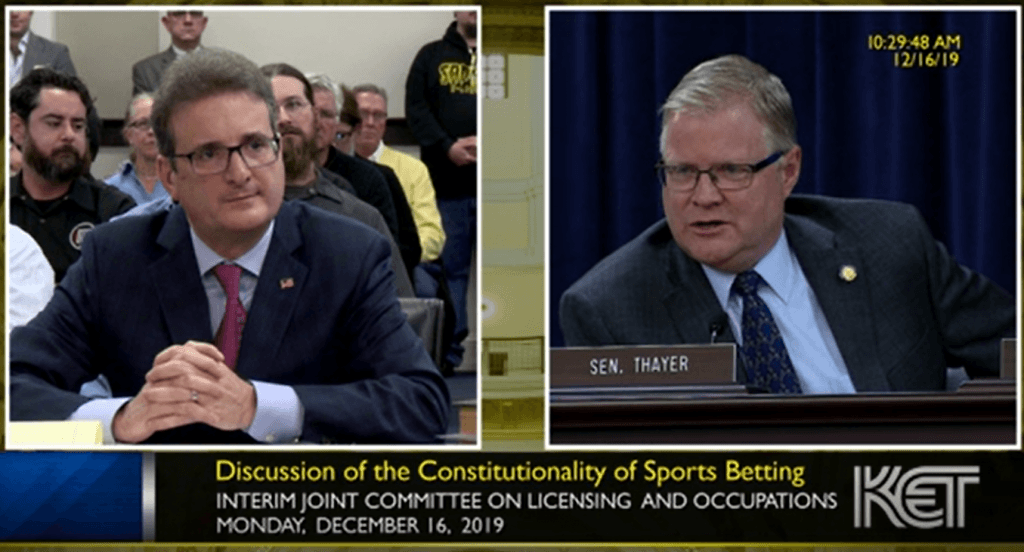[ad_1]
Kentucky lawmakers heard Monday from an attorney practicing in gaming law that the Bluegrass State does not need a Constitutional amendment in order to legalize sports betting.

Sports gaming attorney Daniel Wallach (left) listens to comments from Kentucky state Senate Majority Leader Damon Thayer during a Kentucky legislative hearing on sports betting. Wallach told lawmakers they could legalize sports betting in the state without needing to amend the state Constitution. (Image: KET.org)
Daniel Wallach told members of the Interim Joint Committee on Licensing, Occupations, and Administrative Regulations meeting in Frankfort that lawmakers can act on the issue. If a Constitutional amendment was necessary, it would require passage by both the legislature in the upcoming session and Kentucky voters in next November’s general election.
Wallach testified at the invitation of state Rep. Adam Koenig (R-Erlanger), who has already filed a sports betting bill for the 2020 General Assembly session. Earlier this year, Wallach created Wallach Legal LLC, a law firm focused solely on sports betting law. He’s also a professor at the University of New Hampshire School of Law, where he co-founded the school’s Sports Wagering and Integrity Program.
In his research, Wallach came across journals from the Kentucky Constitutional Convention back in 1890. He noted three pages of discussions pertaining to a convention member’s proposal for a comprehensive gambling ban, instead of one on only lotteries and other games of chance.
Chance Versus Skill
In debating the stricter prohibition, lawmakers then acknowledged a difference between lotteries and such gaming activities as horse racing or betting on baseball. The difference being that horse racing and sports wagering are games of skill.
That proposed amendment failed, he noted, and four decades later, Kentucky’s Court of Appeals later affirmed that the Constitutional ban on lotteries did not apply to horse racing.
So the debate over whether sports betting is encompassed within the Constitutional ban on lotteries was settled nearly 130 years ago,” Wallach told lawmakers. “That argument is over. The framers considered it and rejected it.”
No votes were taken at Monday’s meeting, which included both state House and Senate members. However, state Sen. Damon Thayer (R-Georgetown), the majority leader in the Senate, called Wallach’s testimony a “mic drop” moment in the debate on sports betting and demonstrates that the issue has been researched extensively.
About Kentucky’s Sports Betting Bill
Koenig’s bill would grant the Kentucky Horse Racing Commission (KHRC) authority to regulate sports betting in the state. Race tracks licensed by the KHRC would be eligible to offer sports betting, as would any “professional sports venue” that holds up to 50,000 seats. That would allow the Kentucky Motor Speedway to house a sportsbook.
Sports betting would also be available to those 18 and older, mirroring the legal age to bet on races.
Similar to the New Jersey law, Kentucky would tax the adjusted gross revenue of online sports betting applications at a higher rate, 14.25 percent, as compared to the 9.75 percent rate brick-and-mortar sportsbooks would be taxed. Race tracks would have another .5 percent tax added to the retail rate, with that money going to the state’s thoroughbred and standardbred development funds.
Online sports betting would require individuals to register first at the track or sports venue before they could wager remotely in the state.
The bill, in its current form, currently prohibits betting on any collegiate sporting event that involves in-state universities. However, lawmakers have said they’re wiling to discuss removing that provision.
It’s similar to the bill Koenig sponsored earlier this year. That sports betting bill passed the House Licensing, Occupations and Administrative Regulations Committee, which Koenig chairs, but it did not get a floor vote in the House due to legislative rules requiring 60 votes to pass fiscal legislation in odd-numbered years. Fiscal bills during legislative sessions in even-numbered years, which is when lawmakers pass the biennial budget, require just a simple majority from both chambers.
‘A Little Bit More Momentum’
In an interview with Casino.org after Monday’s meeting, Thayer didn’t want to predict whether a sports betting bill would pass. However, he thinks its chances in 2020 are better.
“Due to the fact that it’s a lower vote threshold and surrounding states, especially Tennessee, passing it gives us a little bit more momentum to pass the bill,” said Thayer, who does support the proposal.
In addition to Tennessee, which expects to have sports betting launched by the spring, sports betting is currently available in neighboring Indiana and West Virginia. Illinois, like Tennessee, has approved sports betting and is ramping up to allow it next year.
Any sports betting bill passed by the Republican-led General Assembly would need Gov. Andy Beshear’s approval. Beshear, a Democrat sworn in just last week, campaigned on expanding gaming in the state.
Opposition Still Present
The Kentucky sports betting bill will face some opposition as it makes its way through the legislature and potentially in the courts if it becomes law. The Family Foundation of Kentucky, which led the fight against the bill last year, has said it remains opposed to expanded gaming for several reasons, including that the state would profit from the losses of its residents.
In a statement to Casino.org Monday, Martin Cothran, a senior policy analyst for the foundation, said state lawmakers and judges have understood the Constitution to only allow pari-mutuel, charitable gaming, and the state lottery.
“Lawmakers trying to pass sports wagering know that the Constitution stands in their way, and so, instead of writing legislation to deal with the Constitutional reality, they have chosen instead to change the meaning of words,” Cothran said. “We think that most lawmakers are not going to fall for this linguistic sleight of hand.”
The 2020 session starts next month, and the 60-day session will run until April 15.
The post Gaming Lawyer Daniel Wallach Tells Kentucky Lawmakers State Constitution Already Addresses Sports Betting appeared first on Casino.org.
[ad_2]
Source link


